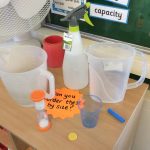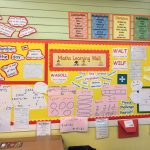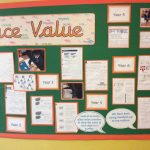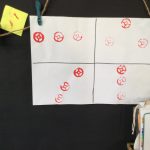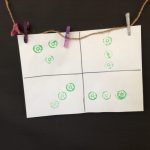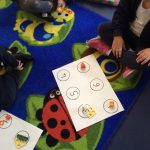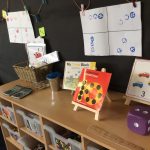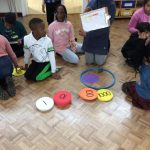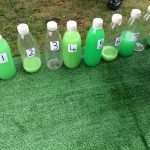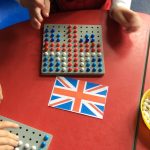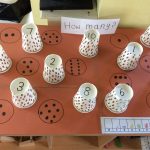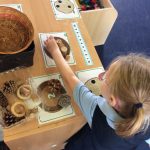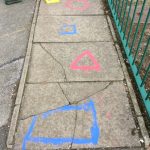Our Approach to Teaching for Mastery in Mathematics
Intent
The intention of our mathematics curriculum is to ensure that all pupils develop a deep, secure, and connected understanding of mathematical concepts. Through a coherent and sequential curriculum, our aim is to foster a love for mathematics, promote resilience in problem-solving, and equip pupils with the life skills to apply mathematical knowledge in various contexts.
Our aims are that our children gain:
- deep and sustainable learning
- sound procedural and conceptual understanding
- an ability to build on previous knowledge
- an ability to reason about a concept and make connections
- an ability to use and apply mathematical skills in real-life
We aim to develop growth mindset thinking, value mistakes and persistence – we ensure children:
- are confident
- enjoy mathematics
- are flexible in their thinking
- have no fear of failure
- are happy to make mistakes
- have a ‘can do’ approach
Implementation
At SS. Mary & John’s Catholic Primary Academy we use a teaching for mastery approach to the teaching of mathematics; this means that all children are taught one set of mathematical concepts and the big ideas in mathematics. Lessons are carefully crafted in order to allow all pupils to access these concepts and ideas and explore the rich connections between them. Teachers use a range of high quality Teaching for Mastery resources which outline maths specific subject and pedagogical knowledge linked to the National Curriculum and the DfE Non-Statutory Maths Guidance. We have high expectations of our pupils and strive to make the mathematics curriculum accessible to all. Pupils will move through the National Curriculum programme of study at broadly the same pace. We recognise that all children need a deep understanding of the mathematics they are learning in order that future learning is built upon firm foundations.
Aspects of mathematics teaching:
- A coherent journey through the curriculum is planned, learning in small steps;
- Learning is through a Concrete – Pictorial – Abstract approach;
- Teachers carefully choose representations which expose the structure of the mathematics and plan to address difficult points in order to develop deep understanding of concepts;
- Children are taught to think mathematically and reason logically – looking for patterns and relationships;
- Communication and oracy – precise mathematical language is used in oral/written explanations, expecting pupils to explain their thinking in whole sentences supported by stem sentences and sentence starters;
- Ensure pupils have opportunities to work collaboratively;
- Teaching is episodic and whole-class based with everyone covering the same content;
- Adults use skillful questioning to reveal, probe and address misconceptions;
- Variation is used to explore the essential features of concepts;
- Mathematical skills are practised, applied and assessed across the curriculum;
- A mathematically rich environment supports learning;
- Fluency and flexibility are developed in every lesson (including looking at relationships and making connections);
- Adaptive teaching within lessons guided by the EEF’s ‘Five-a-Day’ principle: explicit instruction, cognitive and metacognitive strategies, scaffolding, flexible grouping and using technology effective assessment for learning using questioning and scaffolding so that all pupils can access the learning.
- Children grasping a concept rapidly will be challenged through problem solving and reasoning questions;
- Skillful assessment for learning identifies children who are struggling to grasp concepts leading to guided groups and catch up sessions with qualified teachers or teaching assistants, and if required, structured interventions;
- Full exploration of each concept before moving on, pupils will have plenty of practice to embed ideas. Struggling learners will have ample time to remediate when necessary and advanced learners will have enough opportunities to deepen their understanding.
Curriculum map:
The curriculum sequences small steps within each new mathematical topic across each year group. Pupils spend far longer on key mathematical concepts in number and calculation allowing a depth of understanding enhancing progress and understanding within all mathematical areas. Those children who grasp the concepts more quickly are given opportunities to deepen their knowledge further by improving their reasoning and problem solving skills rather than accelerating on to new curriculum content. Curriculum planning in other subject areas provides opportunities for pupils to use and apply their mathematical skills.
Mathematics and Inclusion
At our school, we teach mathematics to all children, whatever their ability and individual needs. Mathematics forms part of the school curriculum policy to provide a broad and balanced education to all children. Through our mathematics teaching, we provide learning opportunities that enable all pupils to make good progress from their starting point. We strive hard to meet the needs of those pupils with special educational needs, those with disabilities, those with special gifts and talents and those learning English as an additional language, and we take all reasonable steps to achieve this and give equal opportunities to all pupils.
When progress falls significantly outside the expected range, the child may have special educational needs. Our assessment process looks at a range of factors – classroom organisation, teaching materials and adaptive teaching – so that we can take some additional or different action to enable the child to learn more effectively. Assessment against the National Curriculum allows us to consider each child’s attainment and progress against age related outcomes. This ensures that our teaching is matched to the child’s needs.
Intervention through SEND support will lead to the creation of a provision map for children with special educational needs, where they will receive specialist or targeted support with specific targets relating to mathematics. Teaching assistants are timetabled on class provision maps to work on these targets with children during the course of the week. Support teachers and teaching assistants are used for planned intervention groups and/or 1:1 tutoring. Different age appropriate interventions are used to support automaticity of number facts and number fluency.
There may be a need to give a minority of pupils in some year groups a bespoke programme of learning due to their individual learning needs which is supported by our SENDCo. We implement recommendations from the EEF’s guidance report, ‘Special Educational Needs in Mainstream Schools’ which suggests that schools take a tiered approach to educational support, considering how whole class teaching could be made more accessible as well as providing targeted interventions.
Impact
The impact of the curriculum design will lead to outstanding progress over time at all key stages, from the children’s starting points on entry. Children will leave school attaining their very highest possible outcomes in relation to Age Related Expectations. It is our aim that all children will at least meet Age Related Expectations.
The curriculum, including the calculation policy, will enable teachers to consistently plan and deliver lessons of the highest standard and children’s outcomes will be of the highest possible.
Children will be able to make useful connections and solve practical problems that they encounter in real life.
Children will be confident, resilient, self-motivated, independent learners with a thirst for challenge and with the mindset that with effort they will succeed.
Maths Documents
- Maths Calculation Policy September 2024 pdf7.7 MbNov 25th, 2024
- SSMJ Mathematics Policy September 2024 inc.CST.pdf pdf405.2 KbSep 18th, 2024
- SSMJ Mental Maths Guide pdf6.8 MbSep 9th, 2024
- Mathematics Yearly Overview 2024-2025 pdf105.0 KbAug 15th, 2024
- SSMJ Maths Curriculum Design September 2024.pdf pdf117.9 KbJul 22nd, 2024
- What does mathematics look like at SSMJ.pdf pdf143.0 KbJul 17th, 2024
- Maths Vocabulary Progression Map_EYFS & WRM Y1-Y6.pdf pdf138.5 KbApr 28th, 2024
- Maths Whole school progression-map pdf325.9 KbApr 18th, 2024
- Reception- Autumn Term Medium Term Plan 24-25.pdf pdf91.3 KbJul 23rd, 2024
- Year 1 Autumn 1 Maths Medium term Plan 2024-2025.pdf pdf101.8 KbJul 16th, 2024
- Year 1 Autumn 2 Maths Medium term Plan 2024-2025.pdf pdf101.1 KbJul 16th, 2024
- Year 2 Autumn 1 Maths Medium term Plan 2024-2025.pdf pdf103.7 KbJul 16th, 2024
- Year 2 Autumn 2 Maths Medium term Plan 2024-2025.pdf pdf97.9 KbJul 16th, 2024
- Year 3 Autumn 1 Maths Medium term Plan 2024-2025.pdf pdf105.6 KbJul 16th, 2024
- Year 3 Autumn 2 Maths Medium term Plan 2024-2025.pdf pdf98.5 KbJul 16th, 2024
- Year 4 Autumn 1 Maths Medium term Plan 2024-2025.pdf pdf106.3 KbJul 16th, 2024
- Year 4 Autumn 2 Maths Medium term Plan 2024-2025.pdf pdf101.9 KbAug 15th, 2024
- Year 5 Autumn 1 Maths Medium term Plan 2024-2025.pdf pdf105.3 KbAug 15th, 2024
- Year 5 Autumn 2 Maths Medium term Plan 2024-2025.pdf pdf99.4 KbAug 15th, 2024
- Year 6 Autumn 1 Maths Medium term Plan 2024-2025.pdf pdf105.9 KbJul 16th, 2024
- Year 6 Autumn 2 Maths Medium term Plan 2024-2025.pdf pdf102.4 KbAug 15th, 2024
- 2024_Information_for_parents_Multiplication_tables_check_PDFA_v1.1.pdf pdf980.1 KbNov 15th, 2023
- multiplication-square pdf51.6 KbSep 23rd, 2023
- Booklet A 2 times table launch booklet.docx.pdf pdf104.1 KbSep 23rd, 2023
- Booklet K 12 times table.pdf pdf262.6 KbSep 23rd, 2023
- Booklet J 11 times table.pdf pdf213.7 KbSep 23rd, 2023
- Booklet I 7 times table.pdf pdf264.5 KbSep 23rd, 2023
- Booklet H 9 times table.pdf pdf264.9 KbSep 23rd, 2023
- Booklet G 6 times table.pdf pdf265.0 KbSep 23rd, 2023
- Booklet F 3 times table.pdf pdf262.7 KbSep 23rd, 2023
- Booklet E 8 times table.pdf pdf265.6 KbSep 23rd, 2023
- Booklet D 4 times table.pdf pdf263.8 KbSep 23rd, 2023
- Booklet C 5 times table.pdf pdf403.4 KbSep 23rd, 2023
- Booklet B 10 times table.pdf pdf299.7 KbSep 23rd, 2023
- Y1 WRM Mastery booklet for parents pdf331.7 KbJan 22nd, 2025
- Reception WRM Maths Booklet for parents pdf301.4 KbJul 23rd, 2024
- Nursery WRM Mastery booklet for parents pdf345.9 KbJul 23rd, 2024
- Y2 WRM Maths Booklets for parents pdf322.2 KbApr 17th, 2024
- Y3 WRM Maths Booklet for parents pdf332.1 KbApr 17th, 2024
- Y4 WRM Maths Booklet for parents pdf372.6 KbApr 17th, 2024
- Y5 WRM Maths Booklet for parents pdf364.0 KbApr 17th, 2024
- Y6 WRM Maths Booklet for parents pdf371.4 KbApr 17th, 2024
If you would like more information about the curriculum please contact school where we will be happy to help.

